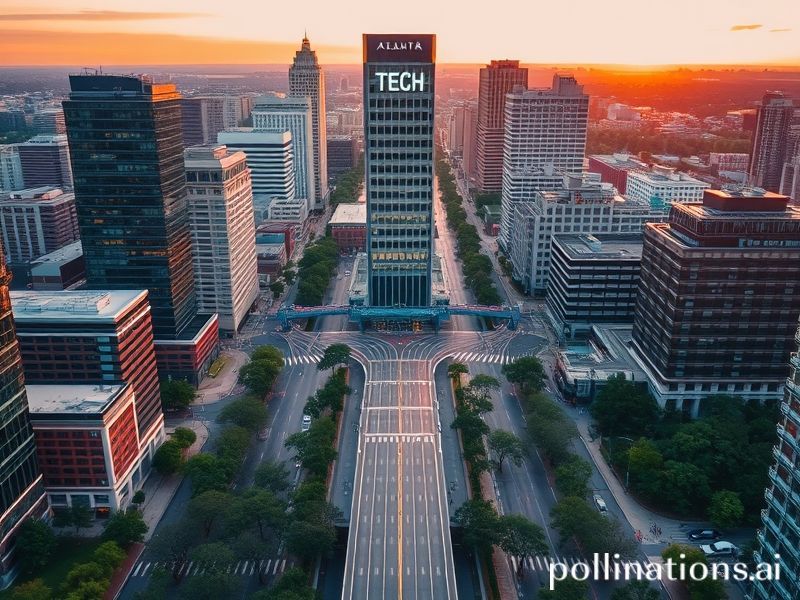Not the Country: How Georgia Tech Quietly Became the Hidden Engine of the Modern World
Where in the World Is Georgia Tech? A Dispatch from the Capital of “Wait, That’s Not in Europe?”
Atlanta, Georgia—If you spin a globe like a drunken roulette wheel and let your finger land where it may, odds are you’ll hit a place that thinks Georgia Tech is either (a) a new EU satellite campus or (b) an elaborate prank played by Americans who ran out of names. Yet for a school wedged between Waffle Houses and the busiest airport on Earth, Georgia Tech punches absurdly above its geographic weight on the world stage. Imagine Switzerland deciding to hide inside a peach and you begin to grasp the paradox.
First, the literal answer: Georgia Tech is parked in Midtown Atlanta, latitude 33.776, longitude ‑84.396, roughly 7,500 km from the actual nation of Georgia in the Caucasus and an even more metaphysical distance from whatever “Atlanta” means to Netflix viewers in Jakarta. The campus itself is a 400-acre petri dish where Southern humidity meets Nordic-grade caffeine dependency, all watched over by a 1930s steam whistle that could wake a hungover cosmonaut on the dark side of the moon. Locals call it “The Ramblin’ Wreck,” a phrase that also doubles as a fair description of the global supply chain these days.
But location is just the opening joke. The punchline is influence. Georgia Tech graduates currently run logistics for Amazon’s pan-European fulfillment centers, design quiet propellers for Taiwan’s latest drone fleet, and hold the encryption keys to half the mobile wallets in Lagos. If you bought a durian in Kuala Lumpur last week using a QR code, congratulations—you probably just paid a Yellow Jacket alumnus their micro-royalty. The place mints engineers the way Geneva mints tax loopholes: quietly, relentlessly, and with a grin that says, “We both know why you’re really here.”
Consider the optics abroad. To a Seoul commuter reading rankings on a 5G subway, Georgia Tech appears as a perennial top-ten engineering school inexplicably located in a city best known for losing Super Bowls and winning traffic jams. To a Parisian bureaucrat negotiating semiconductor subsidies, it’s the alma mater of the Georgian—yes, that’s the demonym—who just outbid Airbus on gallium-nitride patents. And to a recruiter in Dubai? It’s the pipeline where the next Gulf drone-swarm architect is probably skipping class right now to hack on a robotics project sponsored by, well, you.
The deeper gag is that Georgia Tech’s global footprint is powered by a campus culture that looks suspiciously like controlled chaos. Students who can’t legally rent a car in most countries routinely launch CubeSats into orbit with budgets smaller than the average Swiss ski chalet’s wine cellar. While pundits in Brussels agonize over “digital sovereignty,” a 20-year-old from Marietta just open-sourced firmware that lets any village with a soldering iron build its own mesh network—then celebrated with a $3 biscuit so large it violates several UN sanctions on caloric warfare.
Of course, every empire has its contradictions. For all its cosmopolitan swagger, Georgia Tech still celebrates a football rivalry whose trophy is an outdated chunk of coal, a nod to an industry currently barbecuing the planet. The cognitive dissonance is almost charming—like watching a Tesla engineer roll coal for fun on weekends. Meanwhile, Atlanta’s city government, ever eager to rebrand, markets itself as the “Silicon Peach,” a phrase that sounds like a dating-app euphemism invented by someone who’s never been on a date.
Still, if you want to understand where the next decade’s infrastructure will be sketched, follow the money and the humidity. From carbon-neutral data centers in Kenya to flood-resistant bridges in Bangladesh, the blueprints increasingly bear the fingerprints of engineers who once pulled all-nighters in a library named after a 1950s Coca-Cola executive. Global problems, it turns out, are often solved by people who grew up calling them “extra-credit.”
So, where is Georgia Tech? Geographically, it’s at the intersection of Peachtree and Peachtree—because Atlanta hates foreigners so much it names every street the same. Geopolitically, it’s everywhere your smartphone works, your plane lands, and your algorithmic feed decides what you’ll crave for lunch. Existentially, it’s wherever bright kids realize that “changing the world” is less a slogan and more a polite euphemism for “fixing the mess we inherited, one thermodynamic limit at a time.” Stop by if you’re in town; just don’t ask for directions—GPS already graduated from here, and it’s busy rerouting the rest of humanity.







